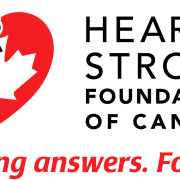FEBRUARY IS HEART MONTH
February is Heart Month, the goal of which is to increase awareness of heart disease and stroke. In fact, since 1956 the Heart and Stroke Foundation has raised and invested more than $1.3 billion in leading-edge heart disease and stroke research. Over this time the research and development has allowed for a reduction in the death rate from cardiovascular disease by 75 percent, 165000 survivors last year alone. However, heart disease and stroke are still the leading cause of death and hospitalization in Canada.
Cardiovascular disease is the leading killer in Canada with 1 in 3 deaths related to heart disease as more than 50 000 strokes, 75 000 heart attacks and 40 000 cardiac arrests occur each year. Another 8 million Canadians are affected at this time and costing the health care system at least 18 billion dollars a year. In fact, heart disease and stroke is the leading cause of hospitalization in Canada, resulting in 1,000 hospital visits each day.
It is reported that 9 out of 10 Canadians has at least one risk factor for heart disease and 40% have at least 3 risk factors (these numbers are up by 30% since I first wrote this article 6 years ago). Heart disease and stroke is the number one killer of women. Risk factors like gender, age, ethnic background and family history we cannot control. However there are a number of things that we can do to prevent heart disease or at minimum decrease its effect. The Heart and Stroke Foundation research has shown that 80% of premature death from heart disease and stroke are preventable. These simple decisions will have a positive effect on all risk factors for heart disease.
1) Stop smoking and avoid second hand smoke – this really is a no brainer – there are so many options today to help eliminate this nasty habit – check with your physician and get started today.
2) Eating a healthy diet – this is achievable with some simple thought – number one – if you put it in the shopping cart someone is going to eat it – if the bad stuff is not available you have to make a different choice. If you can rip the top off and heat it you probably don’t want it. Timing of meals and portion size are just as important as what you are eating. The more natural, the more real the more you want it.
3) For those who are overweight or obese start your weight loss program with some help. There are a number of ways to lose weight healthy, but the most important factor is that you must be able to continue what you are doing to lose the weight. Fad diets typically do not work because you can not maintain them for the long haul. Eating sensibly with regular exercise will always create long term success.
4) Get control of the stress in your life. Stress is a major contributor to heart disease. There are many people in the world who will tell you that they are not stressed – yet their body will tell a different story. Feeling run down, waking and not feeling rested, lack of motivation, poor work results, fear, depression, anxiety, anger, hate, resentment and worry cause a series of reactions in the body that lead to the release of cortisol and other stress hormones. Prolonged elevation of cortisol can lead to decreased sleep, insulin resistance, diabetes, weight gain, osteoporosis, cognitive impairment, damage to brain neurons, high blood pressure, cataracts, a weakened immune system and damage to the gastrointestinal tract. Stress has been linked to dementia and six of the leading causes of death: heart disease, cancer, lung ailments, accidents, cirrhosis of the liver and suicide. How much down time are you planning into your weekly schedule – total down time that allows the body to relax and rejuvenate.
5) Control alcohol intake – science will tell us that a moderate amount of alcohol is actually good for the heart, but too much and you get negative results. The Heart and Stroke Foundation recommends no more than 11/week for females and 16/week for males.
6) Have a regular yearly physical with your physician. A full yearly physical is preventative medicine as the regular tests can alert a problem early making the solution much easier.
7) Control any illness or current disease to the best of your ability. A good example would be diabetes – the choices you make every day about how you control and maintain your health with diabetes will go a long way to determining if you will have heart disease.
8) Regular physical activity or exercise. Every day should involve some type of activity. It can be as simple as a walk around the block. The latest research is showing that three 10 minute sessions in a day are just as effective or maybe even more so than 30 sustained minutes. Everyone, absolutely everyone that cares about their long term health can find 30 minutes every day. Find something you like and take someone along with you.
A look at our kids today will tell us how important the above eight ideas are as 40% of teenage girls are physically inactive, more and more of our children are obese at the elementary school age, 15 – 29 year old men and women make up the largest group of smokers and 30% of men and women in their 20’s are overweight. It is time to turn off the tv and the computer and get outside and go for a walk, build a snowman, play tag, make physical activity fun.
Our generation is being watched – what is it that we are modeling!
The Heart and Stroke Foundation website at www.heartandstroke.ca has loads of valuable information to help you and your family create a healthier lifestyle. Please check it out!!




